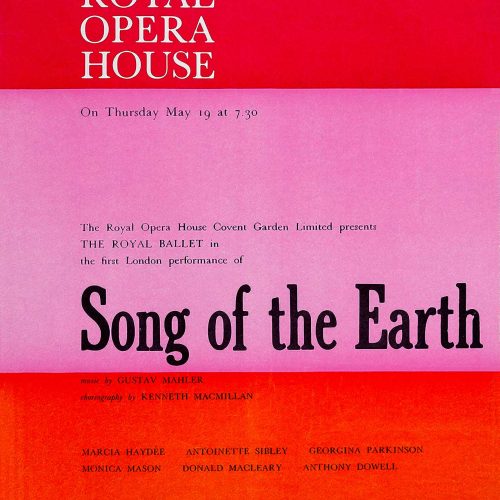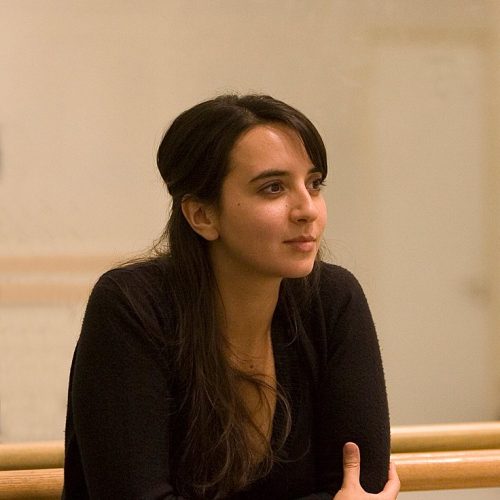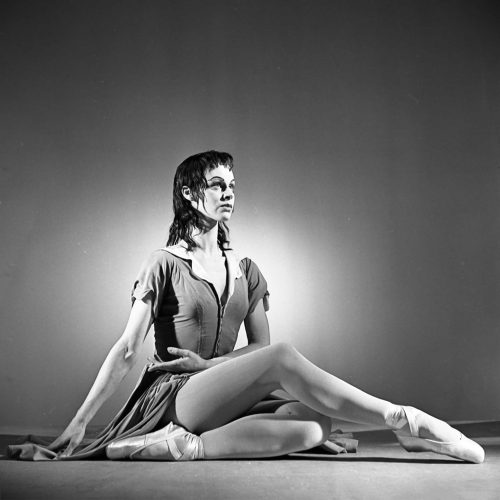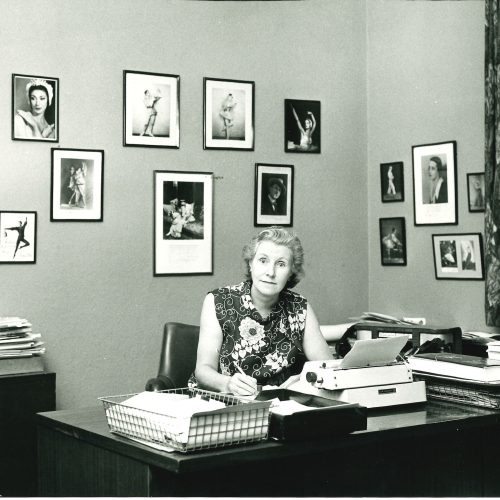Yvonne Minton
Stephen Johnson and Patricia Linton spoke to Yvonne Minton in 2017 about her role as a young member of The Royal Opera, singing Mahler’s Das Lied von der Erde for The Royal Ballet in 1966. Her memories about that, and about the questions which were raised at the time, were crystal clear. She also has some wonderful reminiscences of life in the Royal Opera House at the time, including a bird’s-eye view of the great Maestro Georg Solti. At the end there is a gentle reminder that change is not always easy – in any profession. The interview is introduced by Stephen Johnson.
First published: November 11, 2025
Biography
The singer Yvonne Minton was born in Sydney, Australia in 1938. Having studied and performed in Australia, she came to London in 1961 to pursue her studies and career. By 1966, having become a regular member of the company of the Royal Opera House at Covent Garden, she sang in Gustav Mahler’s Song of the Earth for The Royal Ballet. She created the role of Thea in Michael Tippett’s opera The Knot Garden in 1970. She appeared in a variety of roles in most of the major opera houses in Europe, including Bayreuth, Salzburg and Paris, and at the Metropolitan Opera in New York. She made concert appearances with many of the best orchestras in the world and was particularly noted for her work with Georg Solti, with whom she made many recordings. In 1980, after a decade or more of prestigious international work, she was appointed CBE for services to music.
Transcript
in conversation with Patricia Linton and Stephen Johnson
Yvonne Minton: I grew up in Sydney, so you know hearing things is rather limited. There is – certainly Mahler was not played in Sydney at that time, but I was encouraged to listen to various contraltos there were at that time, and I used to listen to Kathleen Ferrier, and she recorded Das Lied Von Der Erde for Decca. I was only in my teens, but I thought it was wonderful and hoped to do it one day. I just loved words. Always loved words and the words are very interesting. Very personal and they could apply to anybody really. What date was the ballet? 1966. Oh gosh, then that was my first experience of it professionally because I didn’t arrive here until 1961. So, I mean five years later.
Stephen Johnson: How did it come about?
Yvonne Minton: I think I was just told I was going to do it, and I was horrified, absolutely horrified. I thought, ‘They can’t do that to my Das Lied Von Der Erde! A ballet! Golly, no! No! No No!’ And I’m happy to say I was agreeably surprised. I couldn’t see all of it. Of course, I had my back to the stage. Most of the time. We were just at the side of proscenium arch. I remember vividly Marcia [Haydée] doing her all her bits, but also the girls in the second, my second, song – which will be the fourth song, I guess, when they were picking the flowers. I remember that vividly. Strange, isn’t it? It was also beautiful. Yes. I mean it was done with immense, not just sensitivity, but immense passion, but the sort of loving passion. Beauty. They were making beauty on the stage even though it was sad. You can have beautiful sadness as well.
Patricia Linton: I read that [Benjamin] Britten said that the last chord was printed on the atmosphere. Did you feel that?
Yvonne Minton: Well, certainly the last song. The ‘Der Abschied’ is all atmosphere – you have to really play the atmosphere. That’s rather tricky isn’t it, when it’s set as a ballet? But, I mean, I’ve done it so many times that somehow, I don’t know, whatever he [Mahler] has written creates the atmosphere for me to say ‘Ewig”. It’s just there, you don’t have to do anything, you feel it inside and it just floats out.
Stephen Johnson: We were talking about the time when you first heard that this [Song of the Earth] was going to happen and you said that was quite a lot of outrage in various corners.
Yvonne Minton: Well, I had the outrage, certainly. My objection was that it wouldn’t be tasteful enough. And beautiful enough that you know when you, you can’t think of The Nutcracker and Mahler in the same breath, can you really? And I think we just thought there’d be a lot of thumping. I don’t think I heard any feet at all in any of the songs I was doing.
Patricia Linton: Do you associate dance with thumping?
Yvonne Minton: No, no, no, no, no! Well, the way we would dance, with opera singers with dance, would be thumping. Not at all. No, no. But you can hear noise.
Patricia Linton: Yes, well, pointe shoes you can hear tapping.
Yvonne Minton: And I don’t think I heard any of that at all. Nothing.
Stephen Johnson: Did you sense that singing to a ballet audience was in any way different from singing to classical concert audience.
Yvonne Minton: Well, of course the position where I was placed was kind of special because, you know, I’m immediately there, aren’t I really? You don’t have to strive. It’s um. I just felt it was another concert performance. With dancers.
Patricia Linton: It’s so interesting you say you didn’t have to strive.
Yvonne Minton: Yes.
Patricia Linton: Because you were there communicating it to the audience.
Yvonne Minton: Immediately they were, you know.
Patricia Linton: So, the dancers didn’t have to do that.
Yvonne Minton: No.
Patricia Linton: Push themselves out through the proscenium arch. They could just be the pictures.
Yvonne Minton: Indeed. Yes, yes. Very much so.
Patricia Linton: You wouldn’t say a few words about [Georg] Solti, would you?
Yvonne Minton: I could say lots about Solti! I went into the company at age 26 and the first season I did The Ring [Cycle]. So, goodness knows how I did The Ring, but I did. I did it. I was a Rhine Maiden. Well, the Second Rhine Maiden – that’s fine. And a Valkyrie, which is the third act, you know. Bop bop bop bop. And you couldn’t hear any of us really, I don’t think. And then I did a Norn. And the Norn is in the beginning of Gotterdammerung, and it’s quite a… I can still remember the feeling when I did that. My throat hurt like crazy, and I thought, ‘Oh dear, I shouldn’t be doing this’. But anyhow, it was over fairly quickly. And then I subsequently… so he [Solti] was conducting The Ring… and I subsequently worked with him quite a bit and I enjoyed working with him. The big thing about Solti was he rehearsed, and I loved rehearsing, and I loved to get it right. If you have no rehearsal, then you know you’re not confident enough when you get onstage. I mean, they didn’t do that at Covent Garden. You always had rehearsal.
But he [Solti] particularly was most particular. When I did Rosenkavalier for the first time, which was my first really major role there, we had lots of piano rehearsals, and he would sit down at the piano with his enormous orchestral score and play from the orchestral score.
Stephen Johnson: That’s quite a skill.
Yvonne Minton: Why yes. Well, he was a very fine pianist, but he was also a kind man. I was a young singer. He was always kind to me and to those around me, too, as far as I know. When we were recording Rosenkavalier, we were given four weeks to record Rosenkavalier which was – I don’t think anybody would do – have that timing, now. And so, we came to the whole thing with a different feeling, really different atmosphere, because we were relaxed. We got used to the people around us, and then we were in the Sofiensäle, and you know the acoustics were good – wonderful orchestra, of course. I mean that fantastic orchestra, and he and his wife would occasionally have us for lunch or for an evening meal in their hotel and all that sort of thing. So, it was a lot of camaraderie. And also, even later, with the company he had… he loved the company. He loved the jokes that went on. Had a great sense of humour and we would go to a party and then we’d go downstairs, and we’d have… we were really compelled to listen to, oh, what’s the lady’s name? Who always sang so flat…
Stephen Johnson: Oh, Florence Foster Jenkins?
Yvonne Minton: Yes. He adored that. I adored it, and he laughed himself silly, really. He just loved it. Happy moments and really happy because he loved what he was doing, and he had such a zest for life. I mean, enormous energies where everybody out here would really… So that was a real family feeling in the company at that time.
It all changed after that, of course, as businesses do, don’t they?
Patricia Linton: So, after that was Colin Davis at the Opera House [as Music Director].
Yvonne Minton: Yes. Yes, I did lots with him as well. Yes, he was a totally different person. I think the problem for Colin was that I’m not sure that the ‘House’ really wanted him and not everybody in the ‘House’ wanted him there. And so that made it very, very awkward for him.
The transcript of this podcast may have been lightly edited for ease of reading.




